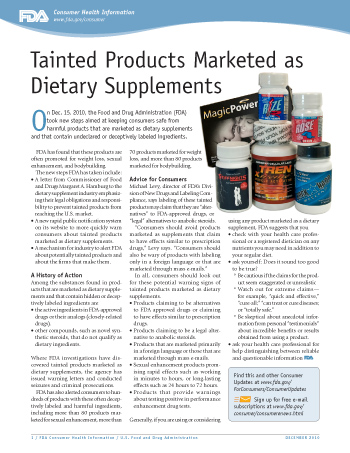For Consumers
Tainted Products Marketed as Dietary Supplements
For slideshow captions, click the play button in the center, the full screen icon in the lower right corner, then "Show Info" in the upper right corner. |
 Get Consumer Updates by E-mail
Get Consumer Updates by E-mail
 Audio of Online Chat (12/20/10)
Audio of Online Chat (12/20/10)
On Dec. 15, 2010, the Food and Drug Administration (FDA) took new steps aimed at keeping consumers safe from harmful products that are marketed as dietary supplements and that contain undeclared or deceptively labeled ingredients.
FDA has found that these products are often promoted for weight loss, sexual enhancement, and bodybuilding.
The new steps FDA has taken include:
- A letter from Commissioner of Food and Drugs Margaret A. Hamburg to the dietary supplement industry emphasizing its legal obligation and responsibilities to prevent tainted products from reaching the U.S. market.
- A new rapid public notification system (RSS Feed) on its website to more quickly warn consumers about these products.
- A mechanism for industry to alert FDA about potentially tainted products and about the firms that make them.
A History of Action
Among the substances found in products that are marketed as dietary supplements and that contain hidden or deceptively labeled ingredients are
- the active ingredients in FDA-approved drugs or their analogs (closely-related drugs).
- other compounds, such as novel synthetic steroids, that do not qualify as dietary ingredients.
Where FDA investigations have discovered tainted products marketed as dietary supplements, the agency has issued warning letters and conducted seizures and criminal prosecutions.
FDA has also alerted consumers to hundreds of products with these often deceptively labeled and harmful ingredients, including more than 80 products marketed for sexual enhancement, more than 70 products marketed for weight loss, and more than 80 products marketed for bodybuilding.
Advice for Consumers
Michael Levy, director of FDA's Division of New Drugs and Labeling Compliance, says labeling of these tainted products may claim that they are "alternatives" to FDA-approved drugs, or "legal" alternatives to anabolic steroids.
“Consumers should avoid products marketed as supplements that claim to have effects similar to prescription drugs," Levy says. "Consumers should also be wary of products with labeling only in a foreign language or that are marketed through mass e-mails.”
In all, consumers should heed these potential warning signs of tainted products marketed as dietary supplements.
- Products claiming to be alternatives to FDA-approved drugs or to have effects similar to prescription drugs.
- Products claiming to be a legal alternative to anabolic steroids.
- Products that are marketed primarily in a foreign language or those that are marketed through mass e-mails.
- Sexual enhancement products promising rapid effects such as working in minutes to hours, or long-lasting effects such as 24 hours to 72 hours.
- Products that provide warnings about testing positive in performance enhancement drug tests.
Generally, if you are using or considering using any product marketed as a dietary supplement, FDA suggests that you
- check with your health care professional or a registered dietician on any nutrients you may need in addition to your regular diet
- ask yourself: Does it sound too good to be true?
- Be cautious if the claims for the product seem exaggerated or unrealistic
- Watch out for extreme claims—for example, "quick and effective," "cure-all;" "can treat or cure diseases; or "totally safe"
- Be skeptical about anecdotal information from personal “testimonials” about incredible benefits or results obtained from using a product
- ask your health care professional for help distinguishing between reliable and questionable information
This article appears on FDA's Consumer Updates page, which features the latest on all FDA-regulated products.
Posted December 15, 2010
For More Information
FDA: Tainted products marketed as dietary supplements potentially dangerous FDA: Productos contaminados comercializados como suplementos dietéticos potencialmente peligrosos Letter to Manufacturers of Dietary Supplements (PDF - 31KB)Tainted Body Building Products Tainted Sexual Enhancement Products Tainted Weight Loss Products 2010 Safety Alerts for Human Medical Products - How FDA Regulates Dietary Supplements
Claims That Can Be Made for Conventional Foods and Dietary Supplements Tainted Products That are Marketed as Dietary Supplements RSS Feed 
Related Consumer Updates
FDA 101: Dietary Supplements Hidden Risks of Erectile Dysfunction "Treatments" Sold Online Warning on Body Building Products Marketed as Containing Steroids or Steroid-Like Substances Reporting Problems to FDA (video) Magic Power Coffee: Potentially Dangerous—Not Magical Productos contaminados comercializados como suplementos dietéticos









